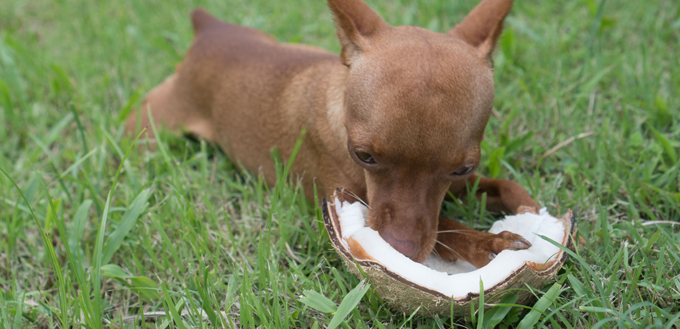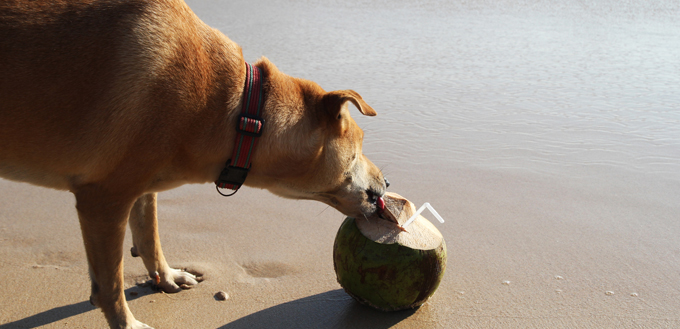Packed with medium chain triglycerides, coconut oil has always been regarded as one of the healthiest oils we could ever give to our pets. The benefits of using this kind of oil can range from improvement in the dog’s digestion, reduction in the severity and incidence of allergic reactions, and the improvement of a pet’s coat and skin health. Moreover, coconut oil is highly valued for its antibacterial, antifungal, and antiviral properties, making it a great way to boost the disease-fighting capability of pooches. But this is coconut oil. How about the flesh or meat of the coconut itself? Does it provide the same benefits? Can dogs even eat coconuts?

It’s Not Only the Oil
Apparently, science has revealed that the oil extracted from coconuts actually come from the dried up and processed meat or flesh of coconuts. While the oil is actually extracted from mature coconuts it should be great news to learn that the oil comes from the meat itself. That being said, it should be safe to provide your dog with slices of coconut meat for it to feast on.
- Coconut meat can reduce the severity and intensity of inflammatory conditions
If coconut oil is rich in lauric acid, then the coco meat can be regarded as naturally rich in this type of medium chain fatty acid. Lauric acid, aside from the fact that it is an excellent source of energy for pooches, has anti-inflammatory properties which can be particularly helpful in reducing the intensity and severity of inflammatory symptoms and signs such as those that occur with arthritis. In other words, if you have a dog that has impaired mobility because of problems in its joints, a feeding or two of coconut meat should help it improve its condition. Do understand that this is not a definitive treatment but rather as symptomatic management only. This means that it will not cure your dog of its arthritis but it sure can make movements more bearable again.
Lauric acid is not only well-regarded for its anti-inflammatory properties; it’s also known for the antimicrobial benefits that it provides. Studies show that it is especially effective in the management of ringworm infections as well as infections caused by other fungal or yeast species. It’s also effective in reducing the effects of Giardia lamblia parasitic infections. There have also been studies confirming its use in mitigating the effects of influenza virus infections. And since it comes in sizable snack portions, improving the immune system of your dog is made even a lot easier.
One of the more obvious benefits of coconut oil is the vast improvement in the coat and skin of your pooch especially with the topical application of the oil. Unfortunately, this is substantially subdued in coconut meats since the meat is consumed via the digestive tract and not applied onto the coat and skin of our pets. Nevertheless, just knowing that the meat itself can already afford our mutts with exceptional antimicrobial protection while also reducing inflammation and boosting immunity is good enough reason to include coconut meat as a healthy snack for our pet dogs.
But there’s a Catch
Like all human foods that we would like to share with our pets, there are certain things that we should always keep in mind whenever we’re giving our pooches coconut meat. These can include the following.
- While it is okay to give mature coconuts to dogs, some breeds may not be able to digest these properly which can lead to stomach upset. Rather than risk it, it is better to give fresh young coconut meats to our dogs.
- Don’t ever give the shell of the coco fruit as this can lead to intestinal obstruction. You may have already heard of some pet owners who purposely give their pets coco shells as some form of dog chew. However, it is still a very risky business.
- Always give coconut meat in moderation. It may be rich in medium chain triglycerides but this can actually cause bloating which can be very uncomfortable for your pet. In many cases of overeating coconut meat, dogs have been known to exhibit severe stomach upset. So, again, be very cautious about the amount of coco meat you’re giving to your pet.
Related Post: Best Coconut Oil For Dogs

How about Coconut Water?
If you don’t like the idea of giving your mutt coco meat, you can at least let it drink coco water. This contains a lot of manganese, zinc, magnesium, calcium, and iron that all play a role in the optimal functioning of the various processes of the canine body. Also present in coco water are enzymes, vitamins, and other electrolytes that are needed to maintain the optimal pH levels in the canine system.
It is also regarded for its energy-boosting benefits as water from baby coconut can contain 50% glucose and about 35% sucrose with the remaining accounting for the fructose content of the fruit. Technically, while you may be alarmed at this percentage of glucose, it is not really that significant. Why? A hundred milliliters of coconut water typically contains about 2.9 grams of sugar. That means that if you’re giving 200 mL of fresh coconut water to your pet, you’re roughly giving it 5.8 or 6 grams of sugar, divided into glucose, fructose, and sucrose.
Related Post: Glucose Monitors for Dogs
The key is to go for fresh coconut water as bottled or processed coco water are often mixed with artificial sweeteners which can significantly bump up its sugar profile. So, if you really want something healthier for your pet dog, make sure to give it only the freshest that you can find.
Both coconut meat and coconut water can be safely given to our pet dogs provided we give only the edible meaty portion and removing the shell or even the husk. Giving it in moderation is also a must. If we have to give it as a drink, it is also best to give it fresh from the coconut itself rather than getting a bottled or processed version of the drink.
Sources:
- Katie Finlay, Can Dogs Eat Coconut?, The American Kennel Club







